iRobot announces the Roomba 980, its suckiest vacuum yet
All about iRobot's smartest ever robo-vacuum
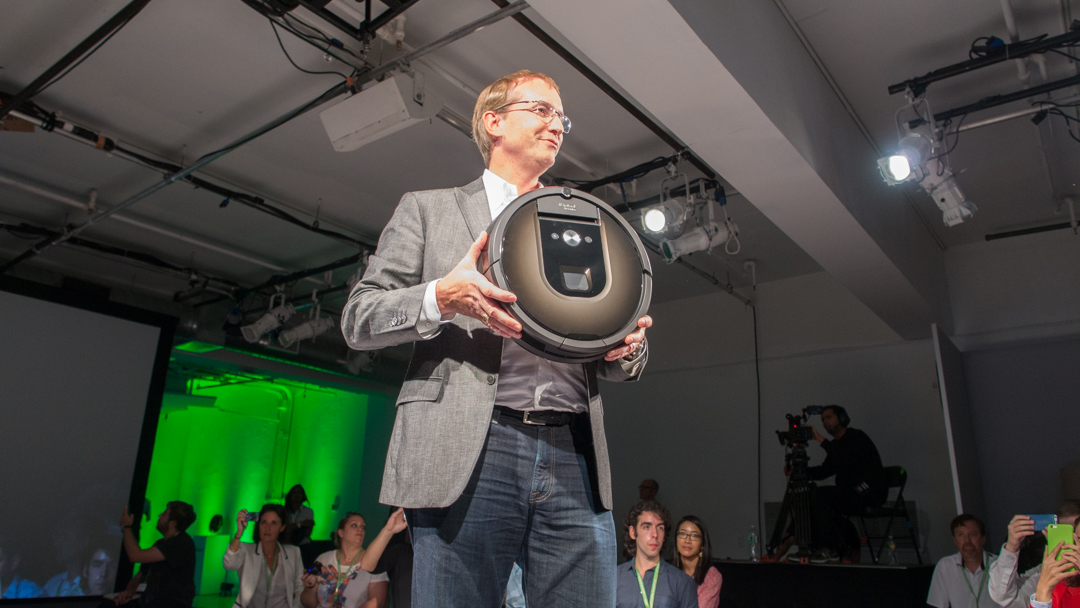
iRobot CEO Colin Angle took the stage at an NYC launch event Wednesday to answer the burning question: would the next-gen Roomba suck even more than before? Through explaining how its latest Roomba, the 980, houses a variety of cutting-edge consumer robotics tech, he concluded that, yes, iRobot's latest efforts really do suck. Twice as much, to be specific.
The Roomba 980 aims to improve on iRobot's current lineup, which currently commands nearly 70% of the home robotics market share. How? This Roomba cleans more of your house, does a better job in doing so, and also acts as the company's launchpad into the Internet of Things. But before Angle actually revealed the product, he gave us a history lesson to illustrate its improvements in robotics.
Lewis & Clark, a lesson in robotics
Angle began by going backward: he dove into discussing the ambitious journey westward by 19th century explorers, Lewis & Clark, who were tasked with the not-very-simple job of finding the West Coast of the US. It's a captivating tale, but I was struggling to see how he would tie this back around to a new Roomba vacuum.
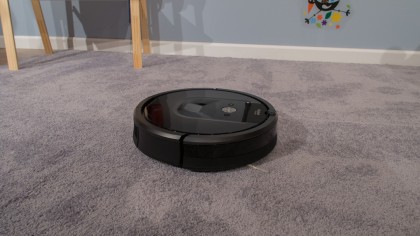
Then, he plotted the duo's path to the West on a screen. It was a jagged path, etched by trial and error. It took them over a year until they arrived at the Pacific. Angle then finally made the connection I'd been waiting for: this zig-zag, haphazard movement was how previous Roomba vacuums functioned.
The Roomba 980 works more like Lewis & Clark's faster, more efficient travels back East. The trip, which took half the time, was made easier by following landmarks the explorers mapped out previously and by avoiding the pitfalls that lead to wasted time and resources.
Roomba 980's trick for improved suckage
The new Roomba goes where no Roomba has gone before. Well, that's not really true. But it can traverse the rooms in your home with an enriched intelligence and efficiency. It does this by making an image-based map of the rooms in your home by utilizing its visual simultaneous localization and mapping technique, or vSLAM for short. iRobot claims that vSLAM is a breakthrough in technology for consumer robotics.
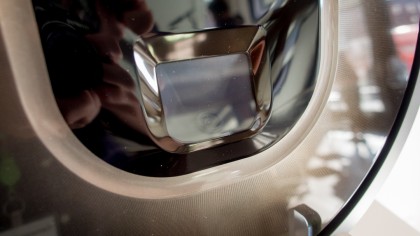
To understand the need for vSLAM, Angle divulged the company's initial struggle to affordably bring vision to the Roomba 980. Its higher-end robotics used in areas of conflict (ones too risky for a human to safely set foot in) are able to see using a laser-powered system. It's incredibly effective and accurate, but much too expensive to put into a consumer-facing product.
Get daily insight, inspiration and deals in your inbox
Sign up for breaking news, reviews, opinion, top tech deals, and more.
In comes vSLAM, a set of technologies that pairs a standard camera to generate a visual map along with a set of sensors to help keep track of where the 980 has and hasn't cleaned yet. Working together, the system can also find and keep focus on areas that are particularly dirty until the muck is taken care of – much like how you would clean yourself.
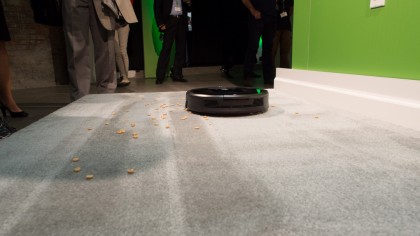
This, and some other new and interesting functionality packed into the Roomba 980's brains, make up what the company is calling iAdapt 2.0. Some of its new-fangled capabilities allow the 980 to nap for a 90-minute charge when its 2-hour battery is zapped, then return to the exact point where it left off to finish the job. Older Roombas would call it a day once their batteries expired, but not the 980.
Looking to improve on the vacuum's aim so it can navigate gently through your house (as to not ding up your belongings or fall down the stairs), iRobot's latest can detect subtle differences between hard floors and carpeting on the fly, even boosting the power output to suck even more when it's on carpet.
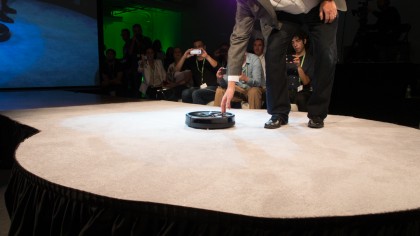
The camera detects - and remembers - furniture as points of interest in your home and can traverse in between chair legs and underneath hard-to-reach spots. Once the visual map is made, the 980 doesn't rely on the camera as much. Christian Cerda, an iRobot exec, even placed a cloth over the vacuum's camera, and it proceeded to clean intelligently by relying on its other sensors.
Thanks to the Roomba 980's many methods of vision and dirt detection, iRobot hopes to closer mimic how humans use a push vacuum and to remedy the complaints that previous iterations of Roomba would clean the same areas over and over. iRobot claims that its latest doesn't tread the same spot twice without reason.
Roomba's ties with IoT
The final part of the Roomba 980 package is its smart connected functionality. With an app called iRobot HOME, owners can wirelessly trigger the 980 to clean. Not only that, they can also schedule a daily cleaning and customize whether the 980 does a regular job or a deep clean from afar. And, unlike with previous Roomba models, the app reports the 980's activity, which allows you to double-check that it actually did its homework, so to speak, while you are away.
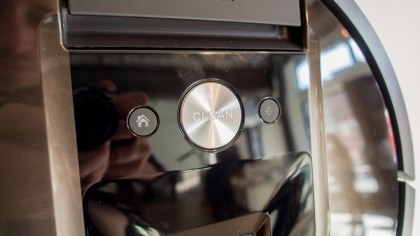
You can still trigger the Roomba to tidy up with a press of its "Clean" button located centrally on its top, but the app aims to make the process easy and convenient for users who aren't home to tend to chores themselves.
The Roomba 980 launches today for $899 in the US. iRobot is looking to Q4 of this year for its entrance into global markets for an undetermined price. Convenience and overall "neat" factor aside, is iRobot's latest smart vacuum robot worth the money? Let us know if you're a current Roomba owner and whether this new one has you looking to upgrade.
Cameron is a writer at The Verge, focused on reviews, deals coverage, and news. He wrote for magazines and websites such as The Verge, TechRadar, Practical Photoshop, Polygon, Eater and Al Bawaba.
